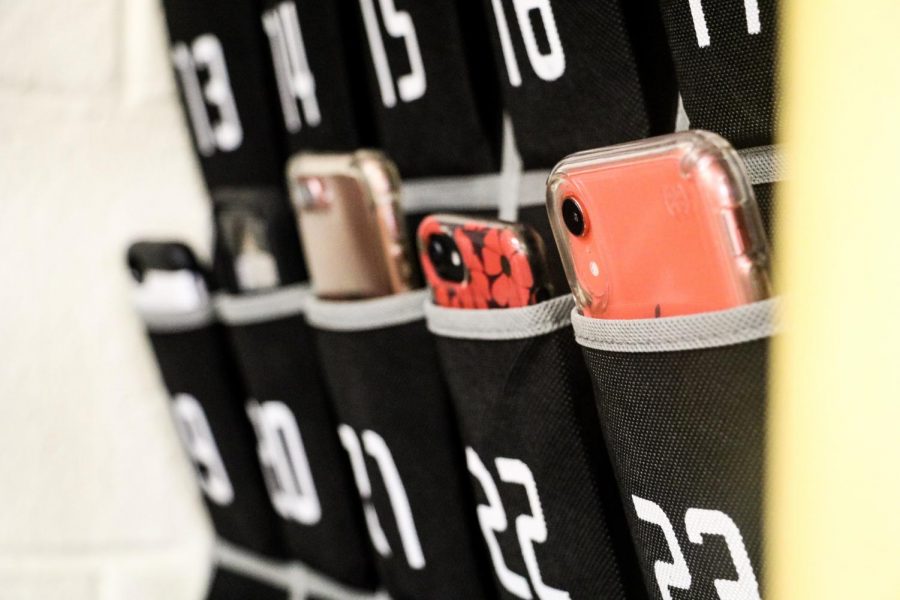Cold sweat dripped from her forehead as she sat in her chair, shaking. Each time the unnamed student heard a notification ring from the phone that was on her teacher’s desk, English teacher Peggy Mellon described her as “exhibiting withdrawal symptoms like you would expect from a junkie.” This narrative, however, is far from unique. According to a 2016 Common Sense Media Report, 50 percent of teens admitted that they felt addicted to their smartphones.
Because of this epidemic, the science department made the decision to implement a solution known as “phone jails” to try to keep students focused on learning and not on their screens. Other classrooms across campus have followed suit.
“Students have become so addicted to their devices that they cannot handle not touching their phones for 15 to 30 minutes, no less 100-minute classes,” science teacher Kendra Huff said. “It got to be so frustrating to me that at the end of last year, when I realized I was not enjoying teaching as much as I used to, I decided to purchase a phone holder over the summer. Then upon returning to school, I found out the science department dean had ordered the pockets for everyone and had taken the initiative to be the first schoolwide department to implement the policy.”
With Snapchat banners constantly appearing on students’ lock screens and students’ faces glued to their phones as they scroll through TikTok, it was found that, on average, smartphone owners touch their phones more than 2,617 times a day.
This problem was highlighted by a survey done in Ms. Huff’s classroom, in which 100 percent of her students “admitted to being addicted to their phones.” Additionally, 25 percent of her students reported that “they wished their parents would monitor their cell phone usage more closely because they cannot do it themselves.”
“Several students [of mine] mentioned they wish they had never gotten on social media because they are now addicted to it and cannot stop even though it is not serving them in a positive way whatsoever,” Ms. Huff said. “They admitted that they know it is not good for them but that they actually cannot quit on their own. That is an addiction.”
It is not just social media causing students to check their phones in class. With instant access to grades through the Student Information System, some teachers have noticed students becoming increasingly concerned with academic perfectionism.
“[You’ve] got kids who are constantly checking SIS to make sure that the[ir] grade hasn’t been updated in the last five minutes, and it’s not healthy,” Ms. Mellon said. “You’re creating a level of anxiety that is unnecessary. There’s nothing you can do about it. While you’re stressing about that on your phone, you’re missing the content that’s going to be for the next grade.”
Despite the apparent increase in phone addiction among students, some felt that the phone jails provided them with a break from the real phone jail they were trapped in.
“I think I work much better without my phone because I get distracted when I see a notification pop-up,” vocal sophomore Marbella Deininger said. “I get distracted [with] what I’m doing, and I go to my phone and stop [my classwork].”
However, despite possible distractions and stress that may come along with smartphones, Ms. Mellon added that the consistent restriction of phone use came with some drawbacks.
“I feel like if the phone is there and it’s being used for an educational purpose, then they should be able to have the phone,” Ms. Mellon said. “There are benefits like being able to whip something up and do a Kahoot or Quizlet Live. I can tell them [the answer and] they won’t remember it, but if they actually look it up and perform the action [for] themselves, they will remember it.”
Some students also felt that the phone jails gave them less of an incentive to work at their best performance levels.
“In most scenarios, I would have to disagree [with phone jails],” communications freshman Jay Kantamneni said. “When I or other people finish a worksheet or complete a lab early, we do nothing but sit there, giving us no incentive whatsoever to actually complete our work efficiently or effectively.”
Due to the negative connotation that the word “jail” brings, Ms. Huff refers to them as “phone pockets.” Since the incorporation of this device and absence of smartphone technology in her classroom, she feels that she has rediscovered her love for teaching.
“I am so much happier and my students are so much more fun to teach because they are so engaged,” Ms. Huff said. “Saying ‘Put your phone away’ 50 times a day is exhausting. I have not said it once all year! It is a dream! I could not be happier. It is all because of the phones. I have their attention 100 percent of the time for 100 percent of the class. It is so enjoyable to teach again.”





























































![[BRIEF] The Muse recognized as NSPA Online Pacemaker Finalist](https://www.themuseatdreyfoos.com/wp-content/uploads/2025/03/IMG_2942.jpeg)

richard northcutt saccaro • Nov 20, 2019 at 4:02 pm
Great Article….Put the phones in JAIL!!!